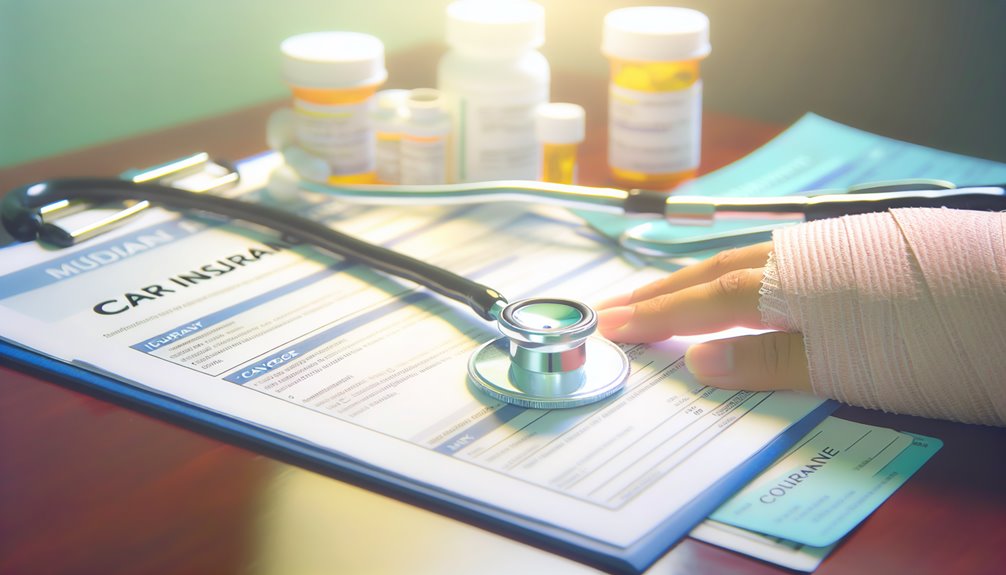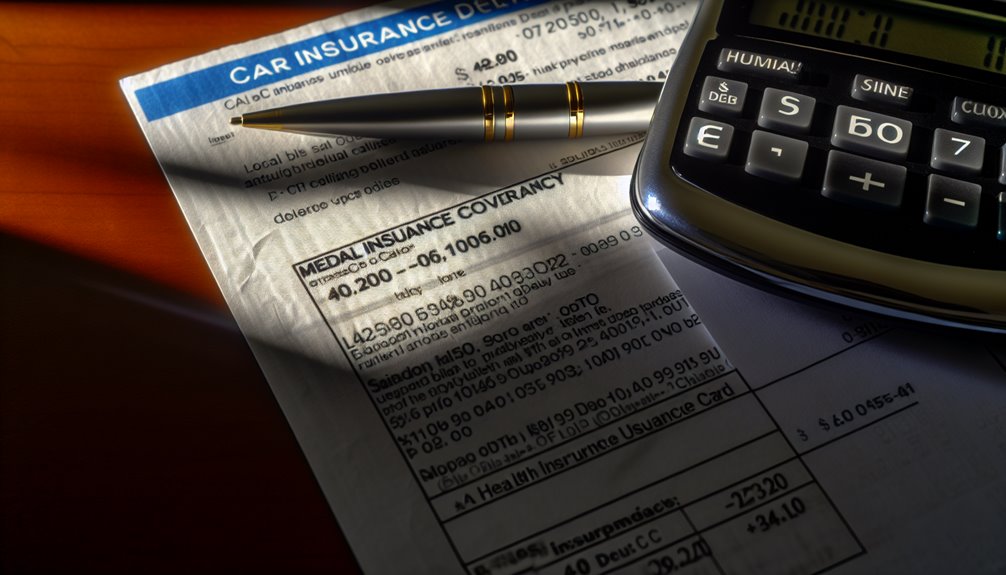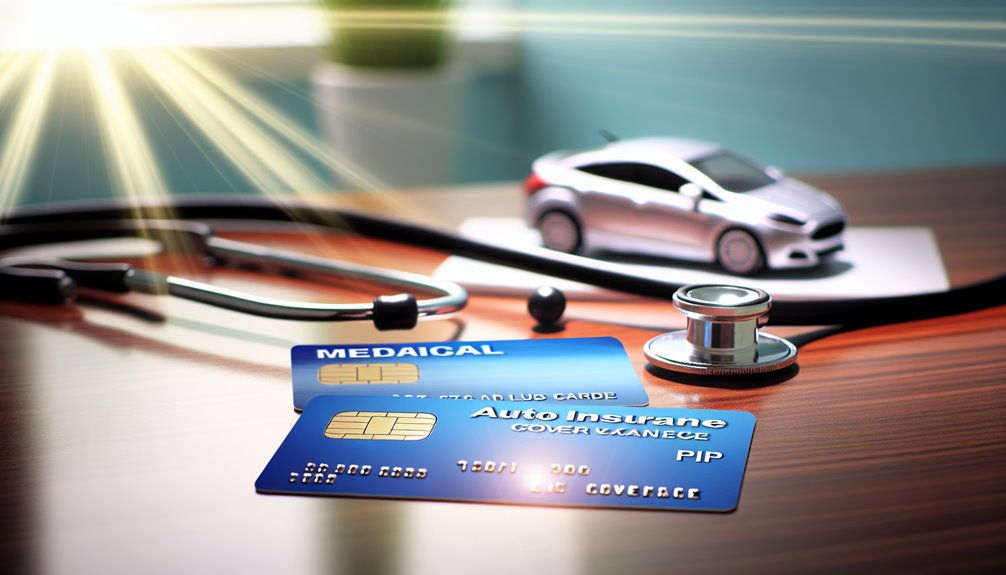Personal Injury Protection (PIP) in your auto insurance policy covers medical expenses, lost wages, and essential services if you’re injured in a car accident, regardless of fault. You’ll get coverage for emergency treatment, hospital stays, rehabilitation, and up to 80% of lost income while you recover. Your policy also extends protection to injured passengers and pays for domestic help like cleaning or childcare if you can’t perform these tasks. PIP includes death benefits for funeral costs and family support up to your policy limits. Understanding your state’s specific PIP requirements and coverage options can help maximize your protection.
Medical Expenses and Treatment Coverage

Personal Injury Protection (PIP) covers three key medical expense categories: emergency treatment, ongoing care, and rehabilitation services. Your coverage extends to immediate post-accident care, including ambulance services, emergency room visits, and critical surgical procedures.
Medical bill reimbursement typically occurs within your policy’s specified limits, regardless of who caused the accident. The treatment approval process begins when you submit your initial claim, and you’ll need to follow your insurer’s guidelines for accessing continued care.
Your PIP benefits encompass doctor visits, specialist consultations, prescription medications, and necessary medical equipment. You’re also covered for diagnostic tests, including X-rays, MRIs, and laboratory work.
For rehabilitation services, your policy includes physical therapy, occupational therapy, and other specialized treatments needed for recovery. You’ll find coverage for both inpatient and outpatient rehabilitative care, with specific limits outlined in your policy terms.
If you require mental health services due to accident-related trauma, these sessions often fall under your PIP coverage as well. Remember to maintain detailed records of all medical expenses and treatments to guarantee smooth processing of your claims.
Lost Wages Reimbursement
PIP coverage provides substantial financial protection by reimbursing a portion of your lost income when injuries prevent you from working. Your policy’s lost wages benefit kicks in when you can’t perform your job duties due to accident-related injuries, helping you maintain financial stability during recovery.
To establish reimbursement eligibility, you’ll need to provide documentation that proves your regular income and the extent of your work absence. Most insurers require:
- A doctor’s note confirming your inability to work and specifying the duration of your medical leave
- Recent pay stubs, tax returns, or employer verification forms showing your typical earnings
- A detailed statement from your employer confirming your missed work days and regular work schedule
Your PIP policy typically covers up to 80% of your lost wages, though specific percentages and maximum amounts vary by state and policy terms.
There’s usually a waiting period before lost wages coverage begins, often around 14 days after the accident. If you’re self-employed, you’ll need to provide additional documentation, such as business records and income statements, to verify your income loss.
Essential Services and Care

Your Personal Injury Protection (PIP) coverage extends beyond medical bills to include essential services and daily care needs.
If your injuries prevent you from performing routine household tasks, PIP can cover the costs of hiring help for cleaning, cooking, childcare, and other domestic duties.
You’ll also receive coverage for necessary medical treatments, including hospital stays, rehabilitation services, and ongoing therapeutic care, while maintaining wage replacement benefits if you’re unable to work.
Medical Treatment Coverage
Most PIP policies provide extensive coverage for necessary medical treatments and services following an auto accident. Your coverage typically includes both immediate emergency care and ongoing medical treatments needed for your recovery.
You’ll find that PIP offers flexibility in medical provider selection, though some policies may require you to use in-network healthcare providers for ideal coverage.
- Your policy covers essential medical services like emergency room visits, hospital stays, surgical procedures, diagnostic tests, and rehabilitation therapy sessions necessary for your recovery.
- PIP insurance helps pay for follow-up appointments, prescription medications, medical equipment, and specialized treatments recommended by your healthcare providers.
- Treatment duration limits may apply to your coverage, typically ranging from one to three years after the accident, depending on your policy terms and state regulations.
Understanding these medical treatment benefits helps you maximize your PIP coverage when needed.
While coverage limits vary by state and policy, you’re generally protected for reasonable and necessary medical expenses up to your policy’s maximum benefit amount.
It’s important to review your specific policy details to understand your coverage scope and any applicable limitations.
Lost Wages Reimbursement
When you’re unable to work due to accident-related injuries, lost wages reimbursement through PIP coverage helps replace a portion of your missed income. Your policy typically covers a percentage of your regular wages, usually between 60% to 80%, up to the specified policy limits. This benefit applies whether you’re temporarily or permanently unable to perform your job duties.
To claim lost wages reimbursement, you’ll need to provide documentation including pay stubs, tax returns, and a statement from your employer confirming your absence. Your doctor must also verify that your injuries prevent you from working. Some policies require a minimum number of missed workdays before coverage begins.
Your reimbursement options may extend beyond traditional employment income. If you’re self-employed, PIP can cover lost business income, though you’ll need detailed financial records to support your claim.
The coverage might also include compensation for essential services you can’t perform, such as household maintenance or childcare. Keep in mind that most policies have time limits for wage replacement benefits, typically ranging from one to two years after the accident.
Domestic Household Support
PIP coverage extends beyond medical bills and lost wages to help with essential household services you can’t perform while recovering from accident-related injuries.
When you’re unable to handle routine tasks due to your injury, your policy can reimburse expenses for domestic assistance that keeps your household running.
Your PIP coverage typically pays for necessary household chores that you’d normally do yourself but temporarily can’t manage during recovery.
These services often include:
- Regular home maintenance like cleaning, laundry, and basic repairs that you performed before your injury
- Child care expenses if you’re unable to provide normal care for your dependents
- Yard work and outdoor maintenance that you historically handled yourself
The amount you’ll receive for domestic assistance varies by policy and state requirements.
You’ll need to document these expenses and demonstrate they’re directly related to your inability to perform tasks due to accident injuries.
Most policies require receipts from service providers and may have daily or total maximum limits for household support reimbursement.
It’s important to check your specific policy limits and requirements before hiring help, as coverage amounts and eligible services can differ greatly between insurers.
Passenger Protection Benefits
Under standard Personal Injury Protection (PIP) coverage, passengers in your vehicle receive the same essential medical benefits and protections as you do. Your policy extends to cover medical expenses, rehabilitation costs, and ongoing treatment needs for anyone riding in your car at the time of an accident, regardless of fault.
This passenger safety protection guarantees that injured occupants won’t face overwhelming medical bills. Your PIP coverage will typically pay for your passengers’ ambulance transportation, emergency room visits, hospital stays, surgical procedures, and follow-up care.
It also covers necessary medical equipment, prescription medications, and physical therapy sessions. However, you should be aware of coverage exclusions that might apply, such as injuries resulting from illegal activities or unauthorized use of your vehicle.
If your passengers miss work due to their injuries, PIP may also provide wage loss benefits to help replace their lost income. The coverage limits that apply to you as the policyholder will generally be the same limits available to your passengers, though these amounts can vary by state and policy type.
Death Benefits and Funeral Costs

The tragic loss of life in an auto accident brings additional financial burdens that standard PIP coverage helps address. Your policy’s death benefits provide vital financial support to help your family manage expenses and maintain stability during an incredibly difficult time.
Death benefits through PIP coverage typically help with funeral expenses and provide financial compensation to your beneficiaries.
You’ll find that these benefits often cover:
- Funeral and burial costs, including services, casket selection, cemetery plots, and memorial arrangements
- Lost wages that would’ve supported your family, calculated based on your income at the time of the accident
- Essential household services you previously provided, such as childcare, home maintenance, or other domestic responsibilities
Your policy’s death benefits aren’t meant to replace life insurance but rather to provide immediate financial assistance following an auto accident fatality.
The amount of coverage varies by state and policy, with typical ranges between $2,000 and $50,000. It’s important to review your policy’s specific death benefit limits and understand how they coordinate with other coverage types like life insurance or accidental death benefits.
State Requirements and Variations
Since insurance regulations vary greatly across America, you’ll find that Personal Injury Protection requirements differ markedly from state to state. Some states mandate PIP coverage, while others make it optional or don’t offer it at all. These state variations can greatly influence your insurance needs and requirements.
| State Type | PIP Requirements |
|---|---|
| No-fault states | Mandatory PIP with specific minimum coverage limits |
| Choice states | Optional PIP with flexibility in coverage selection |
| Tort states | PIP typically not available or required |
Coverage differences between states can include varying minimum coverage amounts, different benefit limits, and distinct deductible options. For example, Florida requires $10,000 in PIP coverage, while New Jersey mandates a minimum of $15,000. Michigan stands out by requiring unlimited medical benefits through PIP. Understanding your state’s specific requirements is essential because it affects both your legal obligations and insurance costs. In states where PIP isn’t required, you might still want to think about purchasing it for additional protection, especially if your health insurance has high deductibles or limited coverage for auto accident injuries.
Coverage Limits and Deductibles

Building on state-specific requirements, PIP coverage limits and deductibles shape both your protection level and premium costs.
When selecting your PIP coverage, you’ll need to balance adequate protection with affordable premiums. Most insurers offer various coverage options, typically ranging from $2,500 to $250,000 per person.
Your deductible choice directly impacts your out-of-pocket expenses and monthly premiums. Higher deductibles lower your premiums but increase your initial payment responsibility when filing a claim.
During policy comparisons, consider these critical factors:
- Medical expense limits – Coverage for hospital bills, surgeries, rehabilitation, and ongoing medical treatment must align with your potential needs and state minimums.
- Lost wage compensation – Protection for income loss during recovery periods, typically calculated as a percentage of your regular earnings up to a specified maximum.
- Essential services coverage – Reimbursement for necessary household tasks you can’t perform while injured, including childcare, cleaning, or yard maintenance.
Your PIP coverage should reflect your personal circumstances, including your health insurance status, income level, and family responsibilities.
Review your policy annually to guarantee your coverage limits and deductibles remain appropriate for your situation.
Filing PIP Claims
When you file a PIP claim, you’ll need to thoroughly document all medical treatments, including keeping copies of bills, records, and receipts from healthcare providers.
You must submit the required claim forms to your insurance company, which typically include a detailed accident report and medical authorization forms.
Your insurer’s specific time limits for filing PIP claims must be followed, which often range from 14 to 30 days after the accident, depending on your state and policy terms.
Documenting Your Medical Treatment
Proper documentation of your medical treatment is vital for successfully filing Personal Injury Protection (PIP) claims. Your medical records serve as significant evidence to support your claim and guarantee you receive appropriate compensation for your injuries.
When seeking treatment, it’s important to maintain detailed records of all medical visits, procedures, and related expenses.
To effectively document your medical treatment for PIP claims:
- Keep a chronological log of all medical appointments, including dates, healthcare providers’ names, facilities visited, and treatments received. Make copies of all medical records, diagnostic test results, and physician notes.
- Save all receipts, invoices, and billing statements related to your medical care, including prescription medications, medical equipment, and transportation expenses to and from appointments.
- Document your symptoms and recovery progress through photos, a pain journal, or diary entries. Note how your injuries affect your daily activities, work capabilities, and quality of life.
Remember to request itemized statements from your healthcare providers, as they’ll need to submit detailed treatment documentation directly to your insurance company.
Your thorough record-keeping will help expedite the claims process and maximize your chances of receiving full coverage.
Submitting Required Forms
Filing a PIP claim requires submitting specific forms to your insurance company within their designated timeframes.
You’ll need to complete and submit the application for benefits form, which typically includes details about your accident, injuries, and medical providers. Most insurers require this initial claim submission within 14-30 days of the incident, depending on your state’s regulations.
Your claim submission must include required documentation such as police reports, medical bills, treatment records, and proof of lost wages if you’re seeking income replacement benefits.
You’ll also need to sign medical authorization forms allowing your insurer to obtain records directly from your healthcare providers.
Be prepared to submit additional forms throughout your claim process, including ongoing medical documentation and wage verification forms from your employer.
If you’re working with multiple medical providers, you’ll need to guarantee each one submits their bills and records using the proper insurance coding and formats.
Keep copies of everything you submit and maintain a log of when you sent each document.
Missing deadlines or failing to provide complete documentation can result in claim delays or denials, so organization is essential to successful PIP claims processing.
Time Limits for Claims
Understanding your PIP claim’s time limits is crucial since each state enforces strict deadlines for filing. Most states require you to submit your PIP claim within 14 to 30 days after the accident, though specific timeframes vary by jurisdiction. You’ll need to act quickly to make certain you don’t forfeit your right to compensation under your policy’s terms.
Your claim submission must include all necessary documentation within these specified time limits:
- Initial notification to your insurance company within 24-72 hours of the accident, depending on your state’s requirements and policy terms.
- Medical treatment documentation submitted within 14 days of receiving care in most states.
- Complete claim paperwork, including medical bills and wage loss verification, typically within 30 days of the incident.
Be aware that missing these deadlines could result in claim denial or reduced benefits. Some states allow extensions for extenuating circumstances, such as severe injuries preventing timely filing.
However, it’s best to file as soon as possible after the accident. If you’re unsure about your state’s specific time limits, contact your insurance provider or review your policy documentation immediately.
PIP Versus Health Insurance

While both Personal Injury Protection (PIP) and health insurance provide medical coverage, they serve distinctly different purposes in accident scenarios. PIP benefits specifically cover medical expenses resulting from auto accidents, regardless of fault, while your health insurance covers general medical needs across all situations.
A key PIP benefits comparison shows that it pays out immediately after an accident, whereas health insurance often requires you to meet deductibles first. You’ll find that PIP covers additional expenses that health insurance typically doesn’t, such as lost wages, essential services, and funeral costs. These health insurance differences matter when you’re coordinating benefits after an accident.
Your PIP coverage becomes your primary insurance for auto accident injuries in states with no-fault insurance laws. This means you’ll need to exhaust your PIP benefits before your health insurance kicks in.
Additionally, PIP doesn’t require network restrictions – you can visit any licensed medical provider. In contrast, your health insurance usually limits you to in-network providers to receive full benefits.
Understanding these distinctions helps you make informed decisions about your coverage needs and how to use each type of insurance effectively.
Cost Factors and Rates
After comparing PIP and health insurance benefits, it’s important to examine what determines your PIP premium costs. Insurance companies use several key factors in their premium calculations, considering both personal and vehicle-related characteristics. Your driving history, age, and location greatly influence your rates, as insurers assess risk based on statistical data and past claims experience.
- Your deductible choice directly affects your premium – selecting a higher deductible typically lowers your monthly payments, while a lower deductible results in higher premiums but less out-of-pocket expense when filing a claim.
- The coverage limits you select impact your costs, with higher protection amounts leading to increased premiums. Most states that require PIP have minimum coverage requirements, but you can opt for additional protection.
- You’ll find various policy discounts that can reduce your PIP premiums, including multi-car discounts, safe driver rewards, and bundling opportunities when you combine PIP with other insurance products.
Your vehicle’s safety features and anti-theft devices may also influence your rates, as these reduce the likelihood and severity of injuries in accidents.
Frequently Asked Questions
Can I Change My PIP Coverage After Being Involved in an Accident?
You can’t change your PIP coverage to apply to an accident that’s already happened.
Any adjustments you make to your PIP coverage will only affect future accidents.
It’s best to conduct an accident impact analysis with your insurance provider to understand your current coverage and discuss potential changes for future protection.
If you’re considering PIP coverage adjustments, they’ll take effect from the date of modification moving forward.
Does PIP Cover Injuries From Accidents While Riding a Bicycle?
Did you know that bicycle accidents account for over 450,000 emergency room visits annually in the US?
Your Personal Injury Protection (PIP) typically covers injuries you sustain in a bicycle accident, even when you’re not in a car.
You’ll receive coverage for medical expenses, lost wages, and essential services up to your policy’s coverage limits.
However, you’ll need to check your specific policy details, as coverage can vary by state and insurance provider.
Will My PIP Rates Increase if Someone Else Causes the Accident?
Your PIP rates may increase after filing a claim, even if you weren’t at fault for the accident.
Since PIP is a no-fault coverage, accident liability doesn’t affect whether your rates go up. Insurance companies often raise premiums based on claim frequency rather than fault.
However, some states have laws protecting drivers from rate increases for not-at-fault accidents. It’s best to check your policy details and state regulations for specific information.
Can I Use PIP Coverage if Injured While Driving Someone Else’s Car?
Nearly 80% of drivers don’t realize PIP coverage follows you, not the vehicle.
Yes, you can use your PIP benefits while driving someone else’s car, as it’s designed to protect you regardless of vehicle ownership.
However, check your policy’s PIP limitations, as some insurers may have specific coverage exclusions when operating vehicles not listed on your policy.
You’ll need to verify these details in your policy documents or contact your insurance provider.
Does PIP Cover Injuries That Occur in Parking Lots or Private Property?
Yes, your PIP coverage will protect you in parking lot accidents and on private property.
You’ll receive the same benefits regardless of where the injury occurs, as long as it’s vehicle-related.
Whether you’re hurt in a mall parking lot, private driveway, or business complex, PIP covers your medical expenses, lost wages, and essential services.
The location doesn’t affect your coverage – what matters is that the injury is connected to the use of a vehicle.
Conclusion
Your Personal Injury Protection (PIP) coverage provides essential financial safeguards when you’re injured in an auto accident. It covers your medical bills, replaces lost wages, and pays for necessary services during recovery. You’ll receive these benefits regardless of fault, but remember that coverage limits and deductibles affect your payout. To maximize your protection, understand your policy details, file claims promptly, and maintain appropriate coverage levels for your needs.

